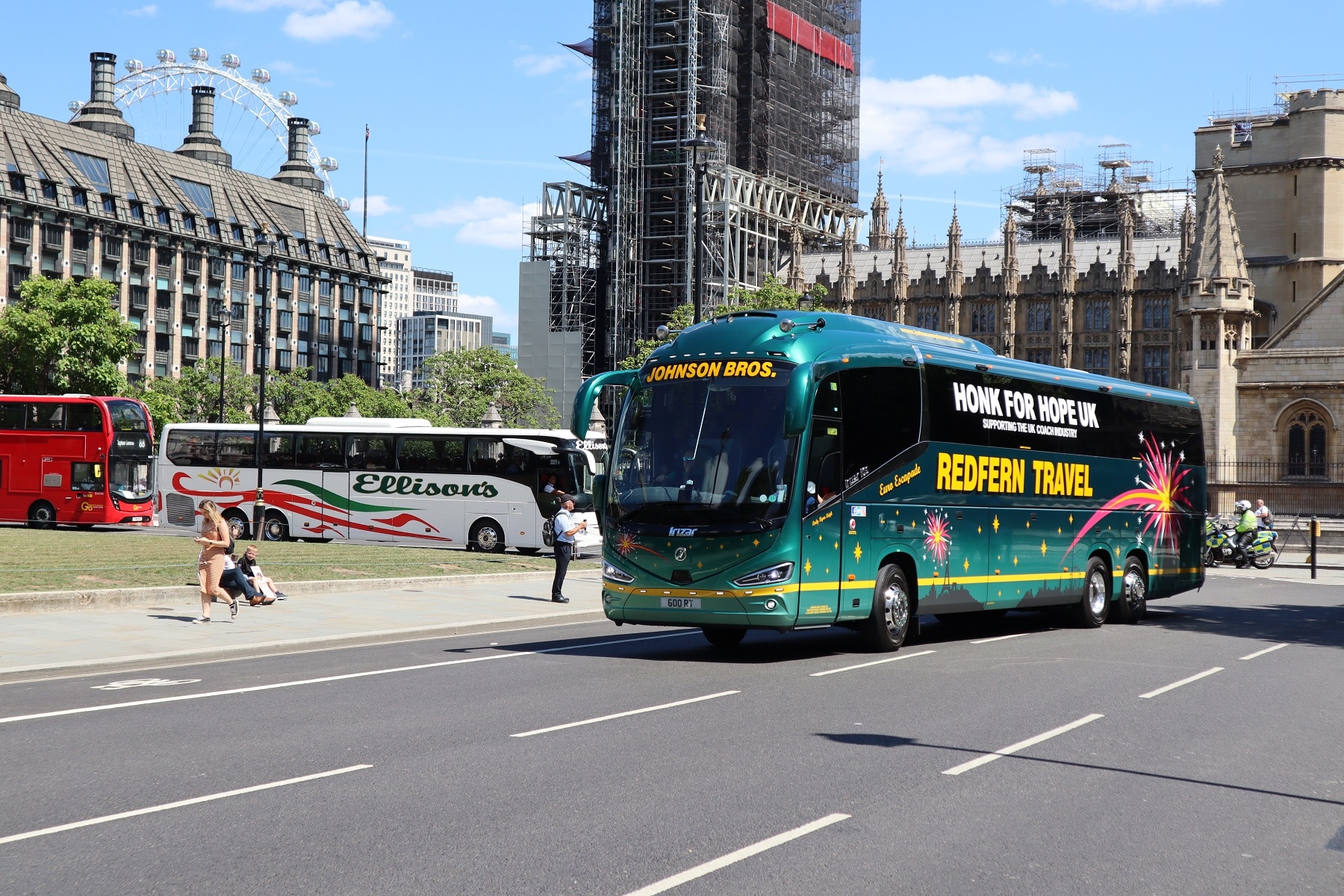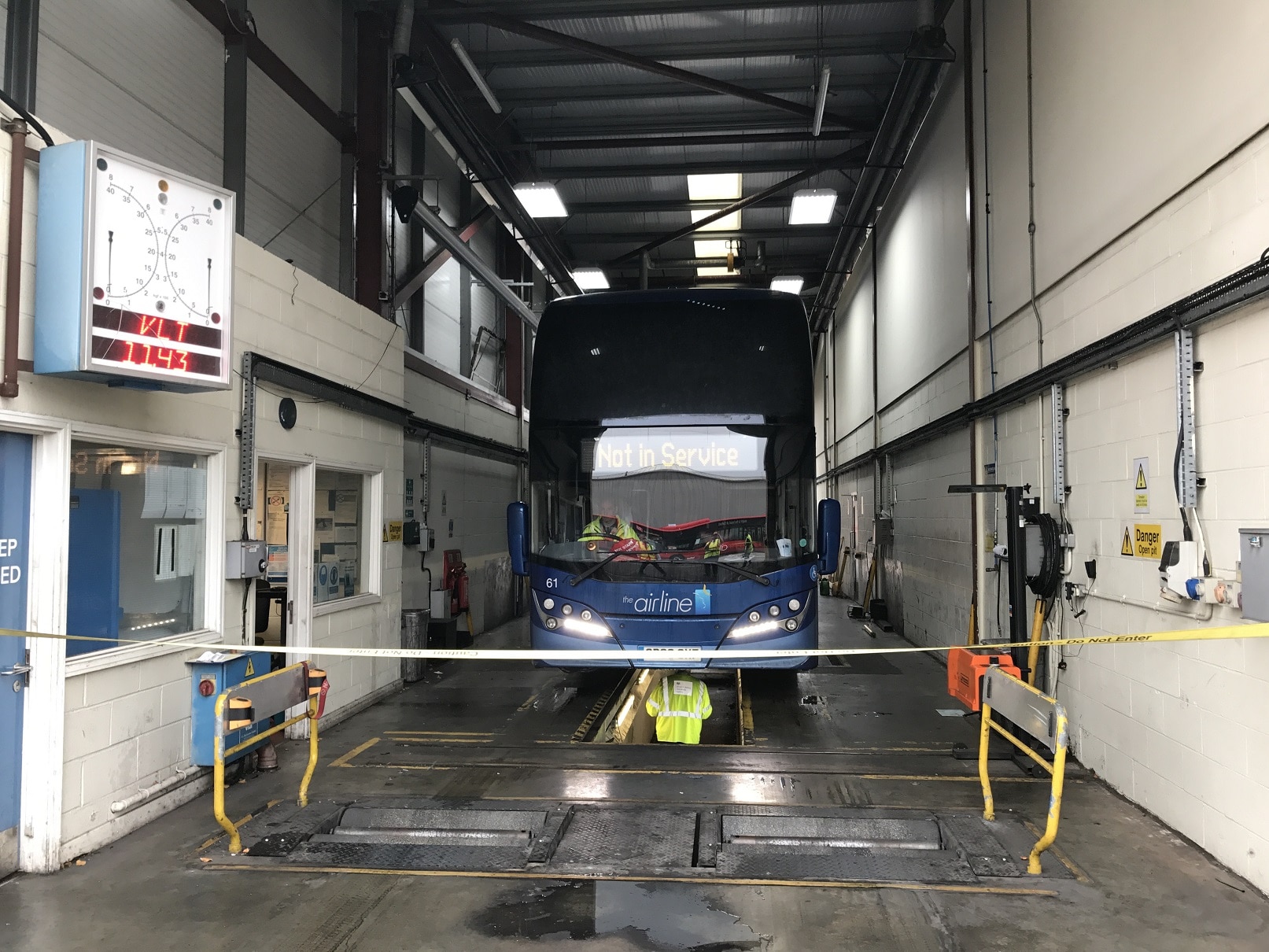The coach industry continued the fight for its future on Monday 20 July when the Honk for Hope movement rolled into London.
Around 420 coaches from as far away as Aberdeenshire, Cornwall and West Wales participated in the most vocal and well-attended Honk for Hope UK protest yet. It aimed to convey the industry’s unhappiness with government failure to provide sector-specific support and to articulate the real threat to the wider economy that widespread failures of coach operators poses.
Key to the procession was its routing via Parliament Square. It took several hours for all of the coaches involved to pass. Many drivers elected to make their feelings known to those nearby using vehicle horns. That stopped only on Police instruction – ironically, after complaints from within the Palace of Westminster.
An old name leads the Honk for Hope London convoy
Heading the Honk for Hope convoy into London was a Volvo B10M with Van Hool T8 bodywork recently painted into period Shearings livery. It commemorates the company’s exit from operating after its parent company Specialist Leisure Group ceased trading.

In second place was a Yutong TC12 operated by North East Coach Travel. It was followed later by the Seaton Burn company’s Van Hool TX27 Astromega double-decker, suitably adorned for the cause.
Managing Director Jenna Rush has led the Honk for Hope movement in the UK.
She has worked with Sam Archer of Fleetwood-based Archway Travel, Dhillon of London General Manager Alan Chown and MJ Forsyth Travel General Manager Matthew Forsyth over the course of the three gatherings that have been staged in England. In addition, a demonstration was held in West Wales on 14 July.
By bringing Honk for Hope to London, engagement with the national media was achieved. Various broadcast and print outlets were represented at the protest. Several MPs also tweeted their approval, while one – Greg Smith, who represents Buckingham – ventured outside to support Masons Minibus and Coach Hire, which is based in his constituency.
Participants travelled to London from far afields
Undoubted winner of the furthest travelled accolade was Kintore-based Premier Coaches. From its base in Aberdeenshire to Parliament Square is over 500 miles via the most direct route. Premier’s UNVI Compa T-bodied Iveco Daily midicoach began its journey south on Sunday 19 July.
Other operators had seen early morning starts. A sizeable and vocal contingent from South and West Wales made the journey. As an indication of when the day began for some, Stanley Travel’s VDL Futura FHD2 left its County Durham base at 0400hrs. The operator was one of hundreds from all points of England to make the journey to London.
Offering further support were several members of the industry’s supplier base. Notably, EVM Direct did its bit by entering a handful of stock minicoaches. They partook in the convoy alongside the other vehicles present.
The Confederation of Passenger Transport was also well represented. It is continuing to press the government to deliver support, says Chief Executive Graham Vidler.
A clear illustration of the difficulties that London presents
While the around 420 coaches that were part of the Honk for Hope demonstration in London made themselves known along the convoy route, it was pointed out that on a normal day in July many more than that would be working in the capital as a matter of course.

What is clear around Parliament Square is that London is hostile territory for coaches.
Poor signal timings, the devotion of more road space to cycle lanes and road layouts that make large vehicles’ interaction with cyclists difficult are coupled to the wider problem of insufficient parking.
That makes a coach driver’s life in London almost insufferable, says one operator.
Honk for Hope’s chosen route led from Abingdon Street north onto Parliament Square. The signal-controlled junction there admitted just two coaches per cycle. Equally, when returning, the convoy turned right from Victoria Embankment onto Westminster Bridge Road. That junction, also signal-controlled, acted as a major bottleneck.
Will politicians’ views change after Honk for Hope London?
Despite the difficulty of threading over 400 coaches through some of the most congested parts of London, the physical and audible presence of so many in a concentrated area succeeded in drawing the attention of politicians.

Whether ministers will change their minds and respond to further proposals to give the industry the support it needs if long-term change is to be avoided remains to be seen.
But participants in the London convoy can be immensely proud of their actions. They proved that they are not afraid to act to make their point.
Operators that are in some cases suffering significant financial stress did their bit under difficult circumstances. The drivers involved remained in good spirits despite challenging traffic conditions and some heavy-handed actions from the Metropolitan Police.
The next Honk for Hope gathering is set for Scotland. More details are due to be announced soon.






























